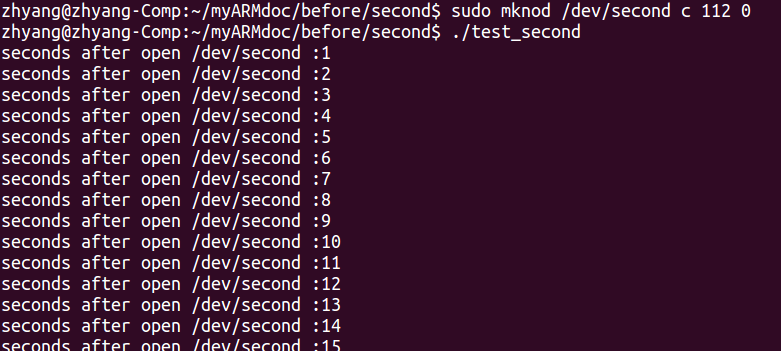second.c:
#include<linux/kernel.h>
#include<linux/module.h>
#include<linux/fs.h> //file_operations
#include<linux/types.h> //dev_t
#include<linux/cdev.h>
#include<linux/slab.h> //kcalloc
#include<linux/uaccess.h> //copy_to_user,copy_from_user
#include<linux/interrupt.h>//中断
#include<linux/timer.h>
#define SECOND_MAJOR 112
static int second_major = SECOND_MAJOR;
//second设备结构体
struct second_dev{
struct cdev cdev;
atomic_t counter; //一共经历了多少秒
struct timer_list s_timer; //设备要使用的定时器
};
struct second_dev *second_devp;
//定时器处理函数
static void second_timer_handle(unsigned long arg){
mod_timer(&second_devp->s_timer,jiffies + HZ); //修改定时器的到期时间
atomic_inc(&second_devp->counter); //经历时间+1秒
printk(KERN_NOTICE "current jiffies is %ld\n",jiffies);
}
//文件打开函数
int second_open(struct inode *inode,struct file *filp){
//初始化定时器
init_timer(&second_devp->s_timer);
second_devp->s_timer.function = &second_timer_handle; //关联
second_devp->s_timer.expires = jiffies + HZ;
//添加(注册)定时器
add_timer(&second_devp->s_timer);
//计数清零
atomic_set(&second_devp->counter,0);
return 0;
}
//文件释放函数
int second_release(struct inode *inode,struct file *filp){
del_timer(&second_devp->s_timer);
return 0;
}
//读函数
static ssize_t second_read(struct file *filp,char __user *buf,size_t count,loff_t *ppos){
int counter;
counter = atomic_read(&second_devp->counter); //atomic原子
//相对于copy_to_user和copy_from_user,这两个函数主要用于完成一些简单类型变量(char、int、long等)的拷贝任务
//对于一些复合类型的变量,比如数据结构或者数组类型,get_user和put_user函数还是无法胜任
if(put_user(counter,(int *)buf))
return - EFAULT;
else return sizeof(unsigned int);
}
//文件操作结构体
static const struct file_operations second_fops = {
.owner = THIS_MODULE,
.open = second_open,
.release = second_release,
.read = second_read,
};
//初始化并注册cdev
static void second_setup_cdev(struct second_dev *dev,int index){
int err,devno = MKDEV(second_major,index);
cdev_init(&dev->cdev,&second_fops); //cdev初始化并关联fops
dev->cdev.owner = THIS_MODULE;
dev->cdev.ops = &second_fops;
err = cdev_add(&dev->cdev,devno,1); //添加设备
if(err)
printk(KERN_NOTICE "error %d adding %d",err,index);
}
//设备驱动模块加载函数
static __init int second_init(void){ //必须有void !!!!!
int ret;
dev_t devno = MKDEV(second_major,0); //此设备号0
//申请设备号
if(second_major)
ret = register_chrdev_region(devno,1,"second");
else { //动态申请
ret = alloc_chrdev_region(&devno,0,1,"second");
second_major = MAJOR(devno);
}
if(ret < 0)
return ret;
//动态申请设备结构体内存
second_devp = kmalloc(sizeof(struct second_dev),GFP_KERNEL);
if(!second_devp){ //失败
ret = - ENOMEM;
goto fail_malloc;
}
memset(second_devp,0,sizeof(struct second_dev));
second_setup_cdev(second_devp,0);
return 0;
fail_malloc:unregister_chrdev_region(devno,1);
return ret;
}
//模块卸载函数
void second_exit(void){ //必须要有void !!!!!!!!!
cdev_del(&second_devp->cdev); //删除设备
kfree(second_devp);
unregister_chrdev_region(MKDEV(second_major,0),1);
}
MODULE_AUTHOR("ZHYANG");
MODULE_LICENSE("Dual BSD/GPL");
module_param(second_major,int,S_IRUGO);
module_init(second_init);
module_exit(second_exit);
test_second.c:
#include<stdio.h>
#include<fcntl.h>
int main(){
int fd;
int counter=0;
int old_counter = 0;
//打开/dev/second设备文件
fd = open("/dev/second",O_RDONLY);
if(fd != -1){
while(1){
read(fd,&counter,sizeof(unsigned int));
if(counter != old_counter){
printf("seconds after open /dev/second :%d\n",counter);
old_counter = counter;
}
}
}else printf("device open failure\n");
close(fd);
}
以上代码在3内核版本中测试通过






















 1143
1143

 被折叠的 条评论
为什么被折叠?
被折叠的 条评论
为什么被折叠?








